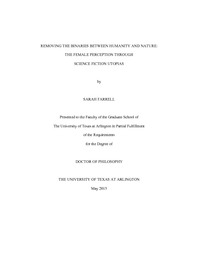
ATTENTION: The works hosted here are being migrated to a new repository that will consolidate resources, improve discoverability, and better show UTA's research impact on the global community. We will update authors as the migration progresses. Please see MavMatrix for more information.
Show simple item record
| dc.contributor.author | Farrell, Sarah Gail | en_US |
| dc.date.accessioned | 2015-07-31T22:10:03Z | |
| dc.date.available | 2015-07-31T22:10:03Z | |
| dc.date.submitted | January 2015 | en_US |
| dc.identifier.other | DISS-13047 | en_US |
| dc.identifier.uri | http://hdl.handle.net/10106/25021 | |
| dc.description.abstract | This dissertation examines utopian science fictions by women from the early modern era and the latter half of the 20th century. While the utopian genre shifts in time, the project focuses on comparing two time periods in order to discuss the topic of humanity’s place in nature. By examining these two distinct eras, I am able to argue that ecofeminist debates about ecological concerns often center around the human/nature binary. These ecofeminist views, I argue, rely on analyzing certain texts in order to glean the truth about the human/nature dichotomy and to offer solutions to these problems. Using Margaret Cavendish’s The Blazing World, Ursula Le Guin’s The Dispossessed, Pamela Sargent’s The Shore of Women, and Margaret Atwood’s Oryx and Crake, five key thematic structures appear that attempt to remove the human/nature dualism: gender relations, linguistic paradigms, the animal/human ideology, spherical constructs, and overall interaction with the environment. The choice of each utopian work highlights some important arguments: First, sub-genres of the utopia establish a network of interacting genres, specifically through The Blazing World (traditional utopia), The Dispossessed (critical utopia), The Shore of Women (separatist utopia), and Oryx and Crake (critical dystopia), adding a complexity to the human/nature debate. Second, Cavendish’s utopia and the other modern science fiction works serve as bookends to the argument about humanity’s place in the environment. The recovery of Cavendish by current ecofeminist scholars demonstrates her relevance to current environmental debates and establishes her as a proto-ecofeminist. Like the utopia genre itself, this dissertation takes an activist role in discovering the scientific schemas that keep the human/nature dichotomy in place. | en_US |
| dc.description.sponsorship | Tigner, Amy L. | en_US |
| dc.language.iso | en | en_US |
| dc.publisher | English | en_US |
| dc.title | Removing The Binaries Between Humanity And Nature: The Female Perception Through Science Fiction Utopias | en_US |
| dc.type | Ph.D. | en_US |
| dc.contributor.committeeChair | Tigner, Amy L. | en_US |
| dc.degree.department | English | en_US |
| dc.degree.discipline | English | en_US |
| dc.degree.grantor | University of Texas at Arlington | en_US |
| dc.degree.level | doctoral | en_US |
| dc.degree.name | Ph.D. | en_US |
Files in this item
- Name:
- Farrell_uta_2502D_13047.pdf
- Size:
- 3.810Mb
- Format:
- PDF
This item appears in the following Collection(s)
Show simple item record


